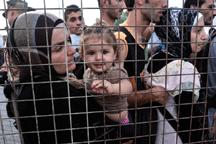
In the 1890s, as Jewish immigration to America was at a historical high point, opponents to admitting Jews to the United States were vocal and their message was clear: Jews posed a threat to the wellbeing of Americans. In newspapers, journals and on pulpits throughout the country, religious, political and intellectual leaders aired their concerns that Jews would come to dominate and destroy the American economy and even the American government itself, cheat Americans of their livelihood and shirk their duty as citizens. It was these fears, together with anti-immigrant sentiment about many other groups who were considered racially and/or morally inferior, that ultimately led the U.S. to pass immigration restriction laws that radically curtailed the number of Jews who could enter into this country seeking refuge and opportunity.
Decades later, during World War II, Americans’ suspicion of Jews was even greater. {mprestriction ids="1,3"}Members of the America First Committee, formed in July 1940 and supported by popular and influential personalities such as Henry Ford and Father Coughlin, argued that World War II was a Jewish war promoted by a Jewish controlled government, and that Jews wanted to risk American lives for the sake of preserving Jewish ones. Many Americans feared that Jews were bearers of radical ideologies such as communism and anarchism to America’s shores, ideologies that were at the root of the current European crisis. It was out of this hatred and this fear that American across the country believed that they should not admit political refugees into the country, and expressed skepticism and bigotry around the Jewish refugee crisis.
But then, as now, Americans were turning their backs not on enemy combatants, despite their arriving from parts of the world embroiled in conflict. Americans were turning their backs on their enemies’ most vulnerable victims: innocent civilians, including children, trying to escape from an increasingly untenable situation. In the past, Americans were choosing to see Jews as a threat to be repelled rather than a vulnerable population in need of safety, and today Americans are viewing Syrian refugees through the same eyes. It was then, and it is now, our moral responsibility to turn away from xenophobia and see these civilians as the people they are — people deserving of safety in a time of turmoil.

On Nov. 16, Kansas Gov. Sam Brownback signed Executive Order No. 15-07, directing that no state agency or organization receiving money from the state would participate or assist in the relocation of Syrian refugees to Kansas. In neighboring Missouri, Gov. Jay Nixon did not join governors refusing Syrian refugees, despite considerable pressure from state leaders. Meanwhile, on Nov. 19, the U.S. House passed the American SAFE Act of 2015, legislation that would effectively shut the refugee program down indefinitely for Syrians and Iraqis while a new bureaucratic procedure is put into place. It is our duty as Jews, who have been victims of anti-immigrant and anti-refugee xenophobia and who know what it is to need a safe haven, to oppose Brownback’s measure and offer public support to Nixon, and to ask our senators to vote against the American SAFE Act of 2015 when it reaches the Senate floor.
Gov. Brownback argues that “we must be sure that we are not admitting terrorists as we try to help the innocents who desire the opportunity for a better life and the basic liberty of religious freedom.” This may be true, but it is not a reason to refuse to admit Syrian refugees. The United States is already one of the most difficult countries for refugees to be accepted into resettlement. Refugees undergo rigorous processing abroad. They go through interviews, security checks and review by the Department of Homeland Security. Opposing Brownback’s order does not mean admitting Syrian refugees without these precautions. It means admitting vulnerable people who our government has carefully vetted in the most rigorous process in the history of the U.S. resettlement program.
This is not an either/or situation. The United States can continue to welcome refugees while also continuing to ensure national security. And we cannot allow our fears of potential terrorism to override our humanity as we face the urgent need of the largest refugee crisis since World War II.
The Jews of the Greater Kansas City area can make a difference in this issue, and it is our moral duty as Jews to act. HIAS, the major Jewish American voice on refugee issues, is urging Jewish Americans to make ourselves heard in order to further their work advocating for and resettling refugees. We can call on our senators, our representatives and our governors to oppose legislation that would halt or restrict funding to the U.S. refugee resettlement program. We can ask them to protect refugees and asylum seekers, not scapegoat them.
Jessica Kirzane is a member of The Temple, Congregation B’nai Jehudah and a PhD Candidate in Yiddish studies at Columbia University in New York.{/mprestriction}